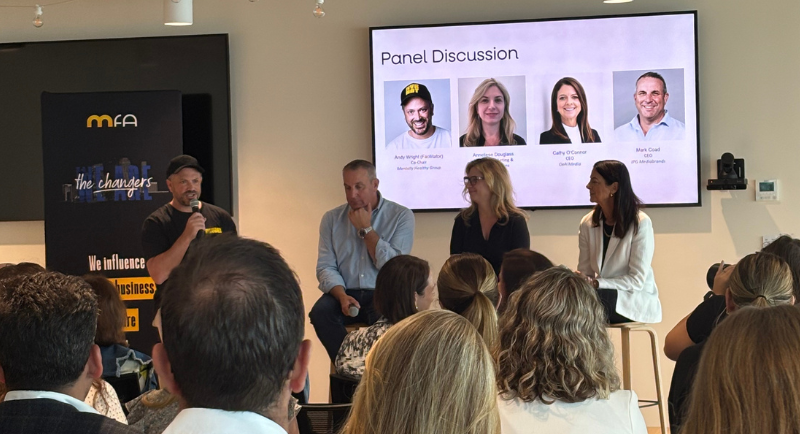The Media Federation of Australia (MFA) has introduced the Psychosocial Safety Code of Conduct, aiming to improve workplace wellbeing across the advertising supply chain.
The initiative represents a united commitment across the industry to set a new standard for workplace wellbeing while ensuring compliance with evolving Workplace Health and Safety (WHS) obligations related to psychosocial risks.
Andy Wright, co-chair of Mentally Healthy Group, facilitated the panel discussion featuring Anneliese Douglass, director of marketing and communications at Nestlé, Mark Coad, CEO of IPG Mediabrands, and Cathy O’Connor, CEO of Ooh!Media, about the code, actioning its objectives and what it means for the industry.
Moving away master-servant position
Speaking to the relationship between agency and brand about the code of conduct, Douglass acknowledged that the partnership between any two businesses working together is never perfect.
“There’s always going to be niggles and things that are issues on the client-side because we don’t understand how the workload required to get jobs done in a creative agency or a media agency, and vice versa. I’ve heard many an agency person go ‘what is that market doing?’”
Douglass noted that the key to overcoming this obstacle is having transparent conversations.
“When an issue arises, being able to just very transparently get in a room and have an honest conversation with your CEO or whoever leads that piece of business is the big unlock,” she said. “That’s moving away from that master-servant position and saying, ‘I want people to work happily on my business.’
“How do I do that? Understand what their issues are, and how can we fix it? Now, it doesn’t necessarily mean there’s always going to be a perfect fix as well.”
“But it’s a great outcome, because clients want that to your point,” Coad chimed in.
He noted that his organisation has previously had those conversations with people or clients about feeling the need for better treatment and that they have been good, fruitful conversations.
“It’s not a master servant thing. Clients don’t know that their people aren’t treating their partners well.
Douglass added: “And that’s where it comes back to being clear about, are your internal behaviours that you expect within your company being displayed instantly? It’s that simple.”
‘We work on the business, they run the business’
When it comes to supporting teams at actioning objectives around safe work environments, O’Connor said that it comes down to ways of working.
“I think we need to be pressing more decision-making down the line, particularly in the younger workforce. They want to have more impact, want a company to have a great reputation and a good corporate system, and their demands on us are very high. Yet we often control decision-making in bottlenecks.
“So it is just saying, what is the leadership going to focus on and what fuels runs the business. We work on the business, they run the business, and that’s a shift for some.”
O’Connor also noted checking on the biases of senior leaders, particularly those whose understanding of the workplace culture as hard work, harden up and no whining, as outdated.
“It’s creating the decision-making power down the line, that they can control their workplace. It’s training them to be able to deal with difficult conversations. It’s easy for us, because we’ve been around a while, we’re pretty well schooled at tough conversations. It’s a capability that’s born of experience, and they don’t have experience.
“I wouldn’t say I have the answers. I’d just say the awareness of people’s journey with this is important. So having the lines of communication is really important.”
‘Talent will decide who they want to work for’
While the MFA psychosocial code of conduct promotes guidelines and framework for a safer, healthier work environment in media organisations, Wright asked how companies, particularly agencies, will ensure that the code will be used in good nature and not as a competitive advantage to win over prospective talent.
Coad acknowledged that there can be a competitive nature between agencies who invest in talent, teach their leaders and are good employers, and those who do not.
“That’s a competitive advantage; the laws of the jungle will prevail because talent will decide who they want to work for.”
He also noted that the differences in offerings to talent between independent agencies and holding companies.
“The reality is we (holding companies) invest in a lot more of that than possibly a smaller operation might, so don’t come to us and expect us to give you our good things and that make us agood employer – but that happens.”
Coad added: “Everybody in and beyond the MFA can benefit from this good work. That’s how important it is… It’s bigger than individual agency initiative.”
Top image: Andy Wright, Mark Coad, Anneliese Douglass and Cathy O’Connor
